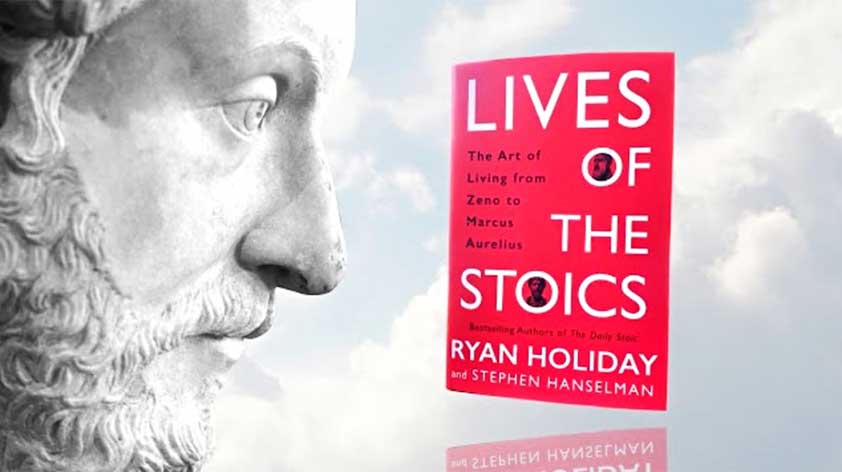
Title: Lives of the Stoics: The Art of Living from Zeno to Marcus Aurelius
Authors: Ryan Holiday and Stephen Hanselman
Year: 2020
Publisher: Portfolio: Illustrated edition
“Don’t explain your philosophy,” Epictetus said, “embody it.”
Philosophy is not just about words, it’s more about actions. It is to learn how to live and how to die. We must find counsel in philosophy and let her save you.
“Lives of the Stoics” Covers the Origins of Stoicism
“Lives of the Stoics” is an amazing book about the beginnings of Stoicism, a philosophy full of wisdom and amazing life lessons. In this review article I will share five Stoics which I found interesting and which we can all learn from. So, without further ado, let’s get stuck in!
Zeno: The Prophet
Let’s start with the founder of Stoicism, Zeno who was born in 334 BC, in Kition, Cyprus. As many of the other Stoics, he had an interesting life, he was born rich but then because of a tragedy his family lost everything, or that is what he thought.
He went to talk with the Oracles, and he was told he had to talk with the dead, he ended up going into a bookshop (the dead are the books, the dead authors and all their wisdom) and finds his mentor Crates.
After training under his new mentor, Zeno learns how to leave his ego, his shyness, his awkwardness and founds his school, Stoicism, basing it on four strong values: Courage, temperance, justice, and wisdom. In old age, he breaks his finger and realizes his mortality, then he continues to hold his breath and dies.
Cicero: The Fellow Traveler
Born in 106 BC, Arpinum, Cicero was an interesting character; he is considered a Stoic and he is remembered for his writings about this amazing philosophy, but the truth is that he was born humble but fought and cheated his way to power.
He studied and wrote philosophy, but he only cared about fame; he is a good example of how not to be. We must acknowledge that, because of his writings, we are able to know more about Stoicism nowadays. He is a good example of why we must read and go deep to see the reality and to not get fooled by superficial information.
Cato the Younger: Rome’s Iron Man
Cato was born in 95 BC, Rome and, as his name suggests, is a good example of a Stoic and a human being. He had a strong character, he did not just talk, he lived his philosophy and he did not sell his soul to corruption, and because of this he was a great leader and example for others.
His goal was to bring the Golden (old) era of Rome back, but he ended up committing suicide, because it was better to die for his own values than those of a tyrant.
Porcia Cato: The Iron Woman
Brutus’s wife and Cato’s daughter, born in 70 BC, Rome is the example that Stoics can also be women. She endured pain and stood for his family values (with Cato as the father there was no other choice).
Stoics defended marriage and sex equality (especially about being able to study and practice philosophy), and Porcia was the best example of what they tried to argue when looking for a partner. Look for someone you can trust, someone with high values, and like the old saying says, someone who you would go to war with.
Epictetus: The Free Man
The last name that I mention here is Epictetus. Born in 55 AD, Hierapolis, he was also born a slave and after thirty years he was physically free. He talked about mental freedom; he was detached from material things and that what can be stolen from you does not belong to you.
He taught to follow the truth and see people’s true intentions, and he did not write or publish anything, all his work was written and saved by his students.
Conclusion
These just were a few examples of the big names from “Lives of the Stoics”, other mentions should be made about Cleanthes: Zeno’s student, Diogenes: who debated in the Senate and won, Seneca: the controversial Stoic, Thrasea: who fought against Nero’s evil, Junius Rufus: Marcus’s mentor, Marcus Aurelius: the philosopher king, and many others.
The last thing I‘d like to share is the last two paragraphs from the book as a conclusion to what Stoicism is and the goal of this book and article:
“That’s what Stoicism is. It’s stretching. Training. To be better. To get better. To avoid one more mistake, to take one step closer toward that ideal. Not perfection, but progress – that’s what each of these lives was about. The only question that remains for us, the living heirs to this tradition: Are we doing that work?”
Favourite Quotes
- “You owe it to yourself and to the world to actively engage with the brief moment you have with this planet. You cannot retreat exclusively into ideas. You must contribute.”
- “When the student is ready, the old Zen saying goes, the teacher appears.”
- “What makes us impressive is what we are able to make of this crooked material we were born with.”
- “Epictetus preached humility. “It’s impossible to begin to learn what one thinks they already know,” he said.”
- “There is no better definition of a Stoic: to have but not want, to enjoy without needing.”









